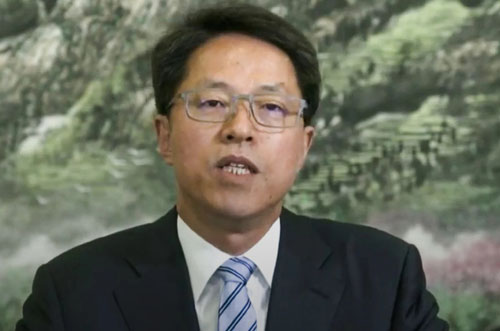by WorldTribune Staff, June 9, 2020
The “main problem” the regime of supreme leader Xi Jinping has with Hong Kong are pro-democracy forces opposed to Chinese Communist Party (CCP) rule, a top official confirmed.
“I think that Hong Kong’s main problem isn’t an economic problem,” said Zhang Xiaoming, deputy director of the Chinese government’s Hong Kong and Macau Affairs Office, specifically dismissing issues such as housing, employment and lack of social mobility for youth that some have fingered as fueling protests in the city. “Rather, it is a political problem.”

In a nearly hour-long speech televised in Hong Kong on June 8, Zhang said the recent conflict in Hong Kong stemmed primarily from the “grave differences” over what the territory’s future should look like.
The communist government on the mainland wants to ensure a prosperous and stable Hong Kong, whereas pro-democracy groups and their “foreign supporters” want to turn the city into “a bridgehead for opposing China and opposing the Communist Party,” said Zhang, who was addressing an online seminar marking 30 years since Beijing approved Hong Kong’s mini-constitution, known as the Basic Law.
Real Hong Kong News noted in a June 8 Facebook post:
In a Basic Law seminar, Deputy Director of the #HongKong & Macau Affairs Office Zhang Xiaoming warned Hongkongers that the fate of Hong Kong beyond 2047 depend on “what they show to China” and that China will not shy away from cracking down “Hong Kong independence”.
Zhang also said that former Financial Times editor Victor Mallet had his work visa renewal denied because he invited a HK independence advocate [Andy] Chan Ho Tin 陳浩天 to speak at the FCC Foreign Correspondents Club, and that it is an iconic event. Zhang asked “why didn’t they ask themselves what are the causes of the result (visa denial)?”
Related: Hong Kong independence leader Andy Chan nominated for Nobel Peace Prize, February 16, 2020
A speech by Chan at the Hong Kong Foreign Correspondent Club in August 2018 sparked an immediate reaction from Beijing followed by a statement one day later by Hong Kong’s chief executive, WorldTribune reported. The Chinese communist regime denounced both the Foreign Correspondent Club and Chan as potential national security threats.
Months-long mass protests erupted in Hong Kong last spring and continued even after the government announced on Sept. 4 that it was withdrawing an extradition bill which sparked them.
Threats to national security must be dealt with decisively, Zhang said, as China’s legislature did last month in passing a new national security law that will prevent and “punish subversion, separatism, terrorism and foreign interference,” in Hong Kong and allow mainland Chinese state-security agencies to operate officially in the former British colony.
The national security law will be “like installing anti-virus software,” Zhang said. He then warned that “the opposition camp radical separatists have been mistaking the central government’s restraint and forbearance for weakness and timidity. They have gone too far.”
Writing for the Wall Street Journal on June 8, Chun Han Wong noted that China’s leadership “believes its main challenge in Hong Kong is a political struggle against forces trying to subvert Communist Party rule, marking a shift in Beijing’s official diagnosis of unrest in the city.”
Delivered as China’s legislature prepares to impose national-security laws on Hong Kong, Zhang’s remarks “departed from past official statements and state-media commentaries that cited economic disparities and social tensions as major factors behind the anti-government unrest that has roiled the former British colony over the past year,” Wong wrote.
Opposition politicians and rights activists in Hong Kong have decried Beijing’s security law as an effort to suppress dissent by overriding the territory’s framework of self-governance — known as “one country, two systems” — under which Beijing had pledged to keep Hong Kong’s “capitalist system and way of life” unchanged for 50 years following its return to Chinese rule in 1997.
The U.S., UK and other Western countries have also condemned Beijing’s move, saying it will undermine international business confidence in Hong Kong and curtail individual freedoms in the global financial center.
U.S. President Donald Trump said last month he would start rolling back preferential policies toward Hong Kong, and threatened to place sanctions on Chinese and Hong Kong officials involved in eroding the city’s autonomy.
Zhang said in his speech: “I also noticed that many people in Hong Kong society are already looking ahead to the fate of ‘one country, two systems’ after 2047. The more secure the bottom line of national security is, the more space there will be for ‘one country, two systems.’ ”
These remarks suggest that Xi favors the use of forceful political solutions, over social and economic remedies, in trying to end the unrest in Hong Kong, said Steve Tsang, director of the School of Oriental and African Studies China Institute in London.
“Xi expects the Hong Kong people to be loyal and patriotic,” and Beijing is signaling that the promise of semiautonomy would only be “available to the Hong Kong people if they identify with and embrace ‘mother China,’” Tsang said.
Intelligence Brief __________ Replace The Media
